AI may be revolutionizing the way we work, but it seems to have an image problem.
In a new global survey of 1.5K+ ecommerce marketers who use AI in a professional capacity, respondents revealed they still feel hesitant to admit when they’re using AI on the job—despite reporting overwhelming positive experiences when they use it.
What, exactly, is stopping the majority of marketers (69%) from always disclosing their AI usage to their managers and colleagues? Let’s walk through—and debunk—a few possibilities.
It’s not that AI doesn’t work
Our survey respondents identified a wide range of benefits of using AI on the job, from improved creativity to improved quality and accuracy.
It’s not that marketers think AI disclosure isn’t important
Overall, the expectation that colleagues and managers disclose their AI usage is actually higher among survey respondents than their own personal rates of disclosure.
It’s not fear of the unknown
According to the research, the vast majority of marketers not only are confident that they understand how AI works, but also trust the outputs they get from AI.
It’s not lack of clarity around policies and procedures
Almost all marketers are at least somewhat familiar with their workplace AI policy—and familiarity increases even more alongside company size.
Fighting AI stigma: 10 stats that’ll make you proud to use AI at work
With all that in mind, it seems likely that marketers are harboring anxiety over possible AI-related stigma—that even though their own experiences with using AI at work are overwhelmingly positive, marketers are not confident that external perception will follow suit.
Well, the data is in—and all signs from our survey point to the undeniable truth that AI is a tool for smart employees, not lazy ones.
If you’ve been using AI at work, you’re certainly not alone. It’s time to own how much better it’s making you at your job.
Need proof? Here are just a few supporting data points from our report:
AI makes marketers more productive.
1
83% of survey respondents say AI has at least somewhat improved their overall work productivity in the past 6 months.
AI makes marketers more effective.
2
84% of survey respondents say AI has at least somewhat improved their overall work performance in the past 6 months.
AI makes marketers more strategic.
3
84% of survey respondents at least somewhat agree with the statement, “AI does the heavy lifting for me so I have more time to focus on more valuable work.”
AI improves the customer experience.
4
90% of survey respondents at least somewhat agree with the statement, “AI helps improve the customer experience faster than I could on my own.”
Bonus points (and pride) if you’re using AI that prioritizes these characteristics, which our survey respondents identified as most important:
Want more? Download the full report for more fascinating findings, including the AI applications marketers believe will be most important in the future. (Spoiler: They go way beyond what ChatGPT can do.)
Klaviyo AI: Your guide to smarter digital relationships.
Jax Connelly (they/she) brings 15 years of editorial experience to their role as lead editor at Klaviyo. She started her career doing SEO at a small digital ad agency and spent most of her twenties managing a financial magazine for a trade association based in Washington, DC. Most recently, they studied and taught writing at Columbia College Chicago during the peak years of the pandemic. Outside of her day job, Jax is an award-winning creative writer who has received honors including 4 Notables in the Best American Essays series, contest awards from publications like Nowhere Magazine and Prairie Schooner, and a residency from the Ragdale Foundation. Jax lives in Chicago, a block away from Lake Michigan.
Learn how B2C marketers can write better prompts using Klaviyo’s ChatGPT app or MCP server in any LLM to analyze performance, optimize campaigns, and move faster.
AI is transforming how consumers discover brands—but LLMs may be rebuilding the same walled gardens brands fought to escape. Why owning your customer data matters more than ever.
# We asked 1.5K+ marketers how they’re using AI at work. Most of them won’t always tell you they are
AI may be revolutionizing the way we work, but it seems to have an image problem.
In a new global survey of 1.5K+ ecommerce marketers who use AI in a professional capacity, respondents revealed they still feel hesitant to admit when they’re using AI on the job—despite reporting overwhelming positive experiences when they use it.
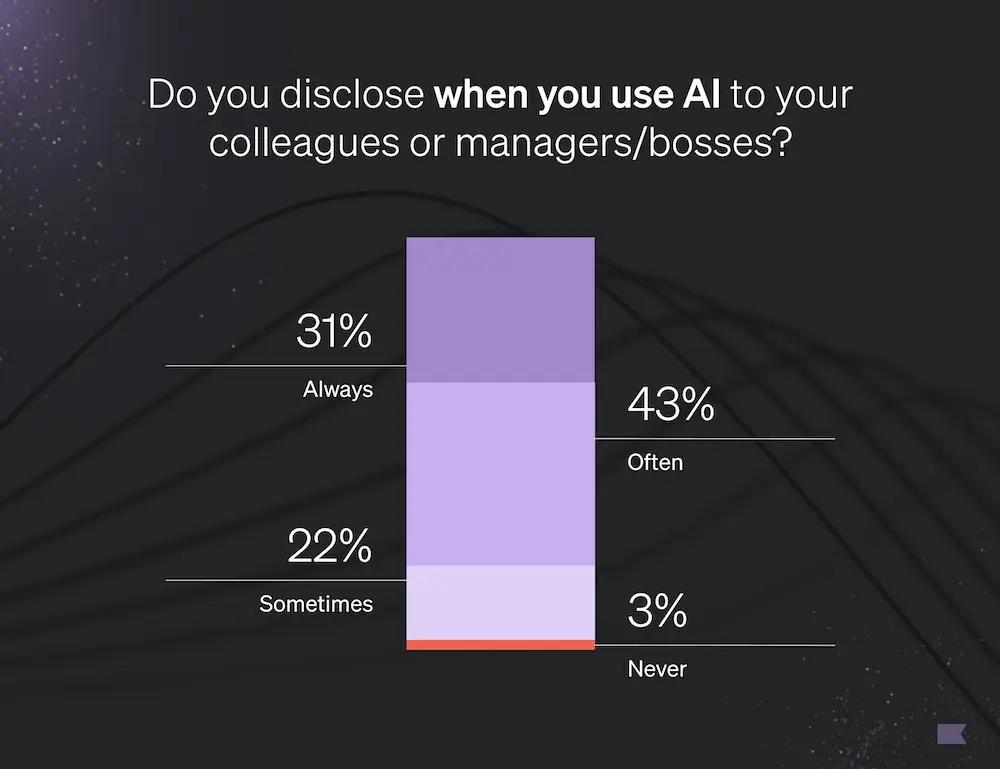
What, exactly, is stopping the majority of marketers (69%) from always disclosing their AI usage to their managers and colleagues? Let’s walk through—and debunk—a few possibilities.
## It’s not that AI doesn’t work
Our survey respondents identified a wide range of benefits of using AI on the job, from improved creativity to improved quality and accuracy.
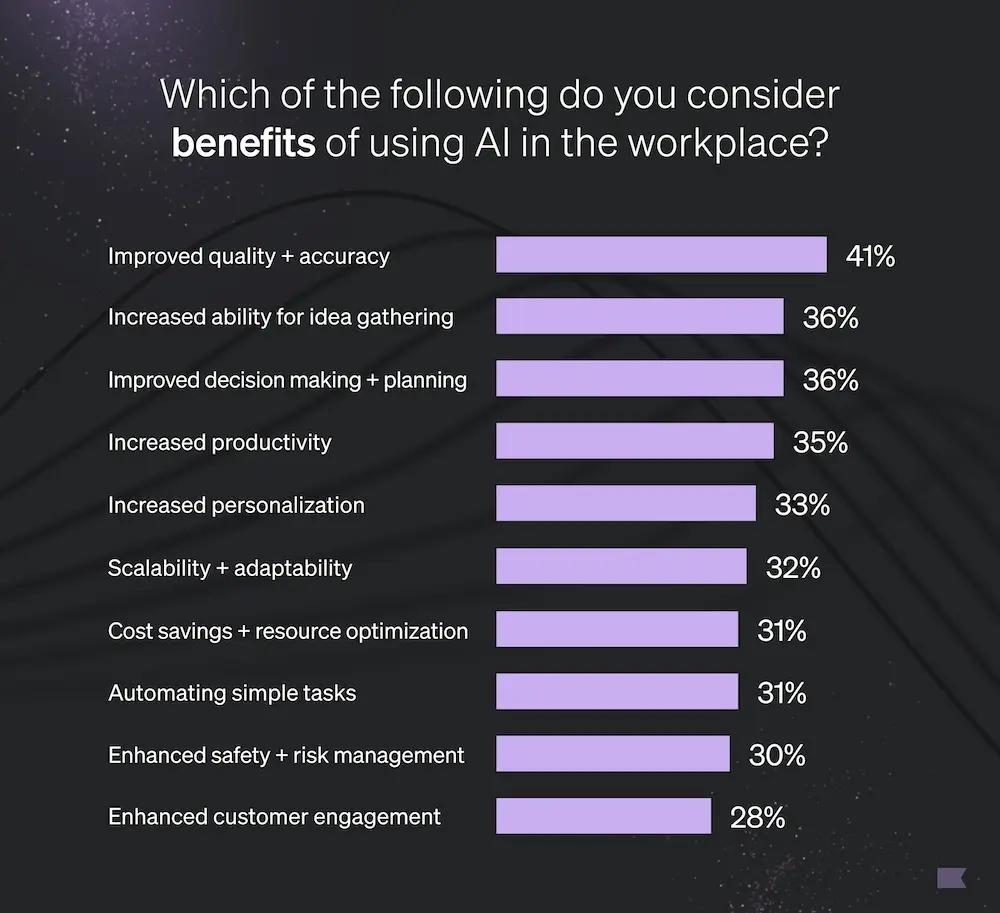
## It’s not that marketers think AI disclosure isn’t important
Overall, the expectation that colleagues and managers disclose their AI usage is actually higher among survey respondents than their own personal rates of disclosure.
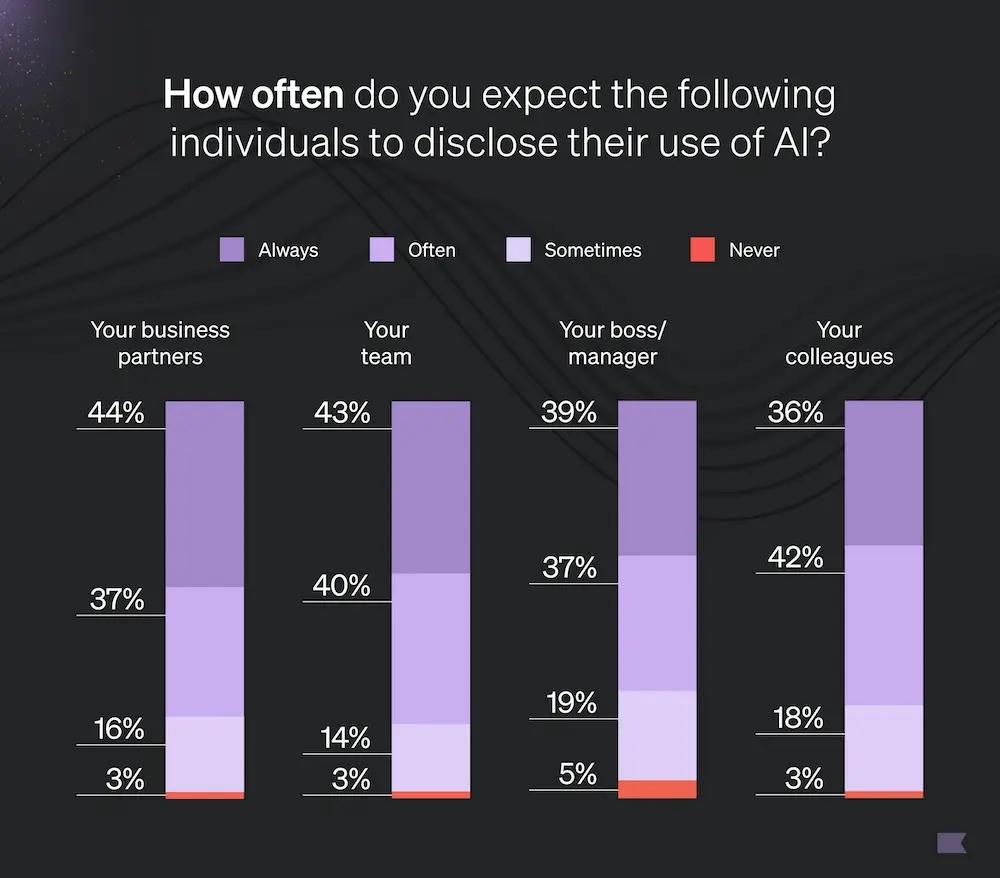
## It’s not fear of the unknown
According to the research, the vast majority of marketers not only are confident that they understand how AI works, but also trust the outputs they get from AI.
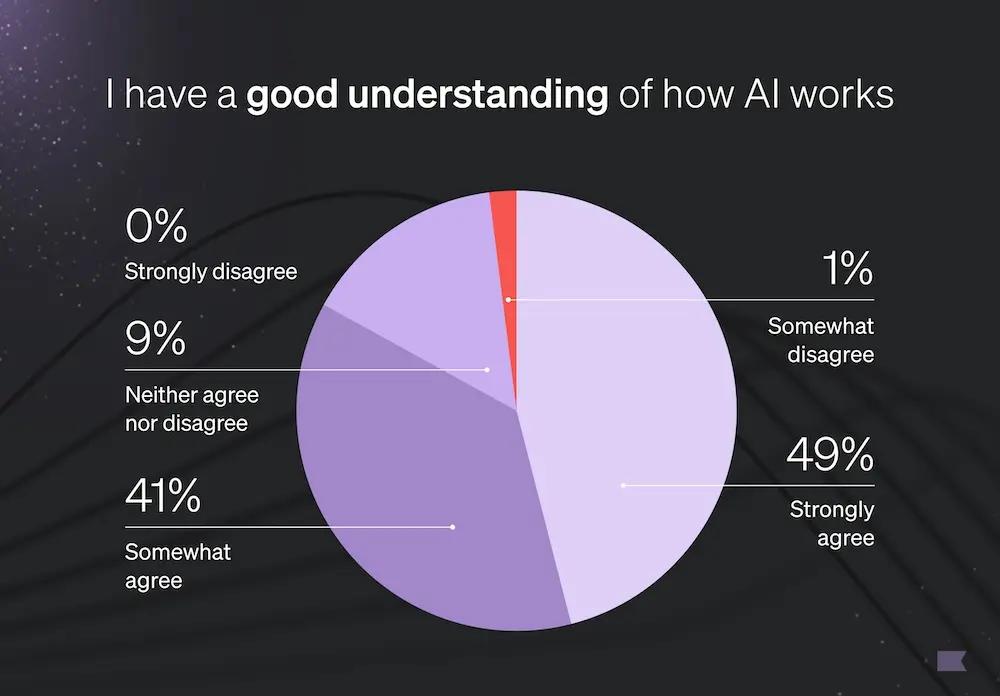
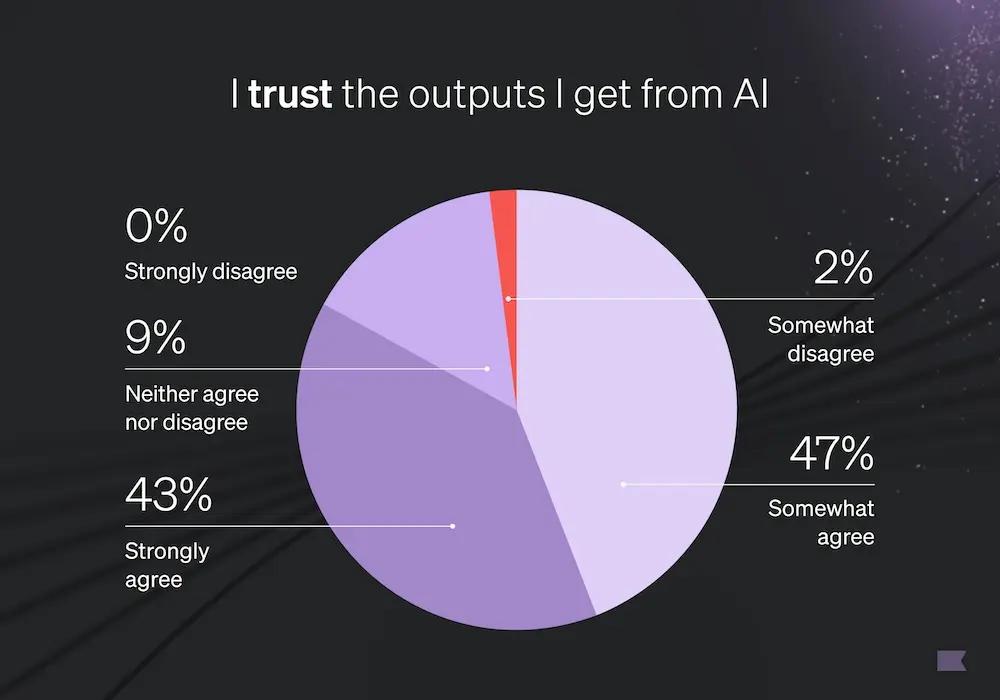
## It’s not lack of clarity around policies and procedures
Almost all marketers are at least somewhat familiar with their workplace AI policy—and familiarity increases even more alongside company size.
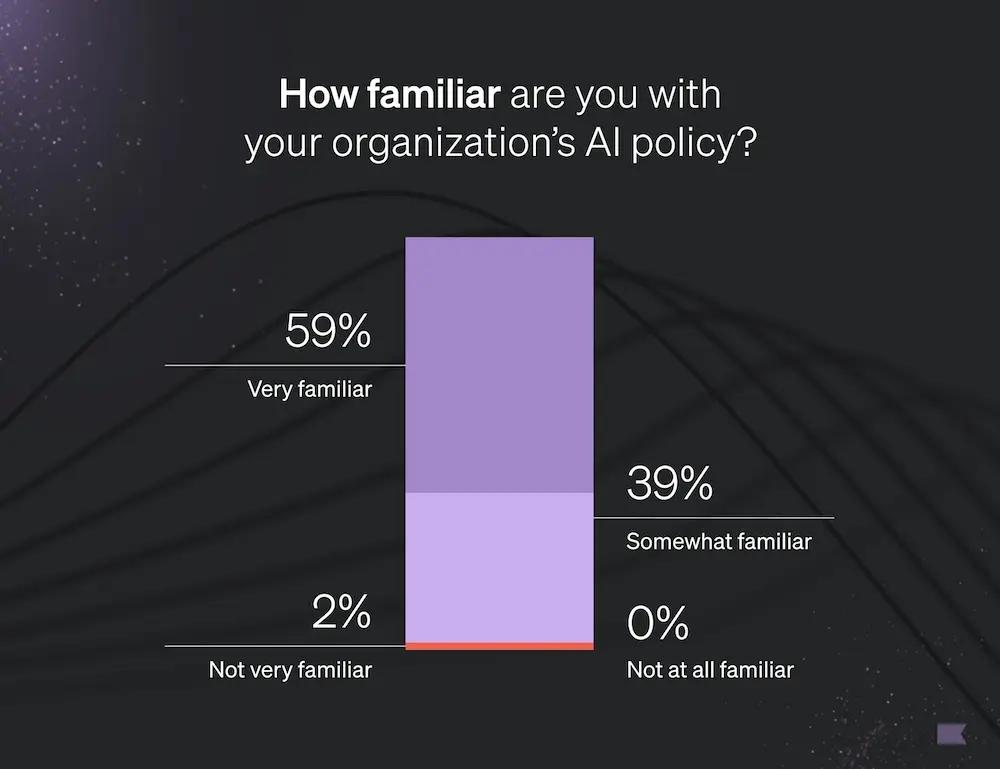
## Fighting AI stigma: 10 stats that’ll make you proud to use AI at work
With all that in mind, it seems likely that marketers are harboring anxiety over possible AI-related stigma—that even though their own experiences with using AI at work are overwhelmingly positive, marketers are not confident that _external perception_ will follow suit.
Well, the data is in—and all signs from our survey point to the undeniable truth that AI is a tool for smart employees, not lazy ones.
If you’ve been using AI at work, you’re certainly not alone. It’s time to own how much better it’s making you at your job.
Need proof? Here are just a few supporting data points from our report:
```json
{
"_key": "31a9006e-152f-40b8-9cd3-00c4a0681d77",
"_type": "steps",
"steps": [
{
"_key": "2feda258-57c2-41af-843f-2a4ea1126521",
"_type": "step",
"body": [
{
"_key": "oR5rmzJRTTTXSt7VQbiIFu",
"_type": "block",
"children": [
{
"_key": "oR5rmzJRTTTXSt7VQbiIGa",
"_type": "span",
"marks": [],
"text": "83% of survey respondents say AI has at least somewhat improved their overall work productivity in the past 6 months."
}
],
"markDefs": [],
"style": "normal"
}
],
"title": "AI makes marketers more productive."
},
{
"_key": "37d18dac-27ab-451f-a6d4-c56fcaad568d",
"_type": "step",
"body": [
{
"_key": "oR5rmzJRTTTXSt7VQbiIHG",
"_type": "block",
"children": [
{
"_key": "oR5rmzJRTTTXSt7VQbiIHw",
"_type": "span",
"marks": [],
"text": "84% of survey respondents say AI has at least somewhat improved their overall work performance in the past 6 months."
}
],
"markDefs": [],
"style": "normal"
}
],
"title": "AI makes marketers more effective."
},
{
"_key": "242ea735-84ab-4df1-a169-0bbcf885535c",
"_type": "step",
"body": [
{
"_key": "oR5rmzJRTTTXSt7VQbiIIc",
"_type": "block",
"children": [
{
"_key": "oR5rmzJRTTTXSt7VQbiIJI",
"_type": "span",
"marks": [],
"text": "84% of survey respondents at least somewhat agree with the statement, “AI does the heavy lifting for me so I have more time to focus on more valuable work.”"
}
],
"markDefs": [],
"style": "normal"
}
],
"title": "AI makes marketers more strategic."
},
{
"_key": "70faf63f-6db4-4b5b-bfd8-4a377a17d7de",
"_type": "step",
"body": [
{
"_key": "oR5rmzJRTTTXSt7VQbiIJy",
"_type": "block",
"children": [
{
"_key": "oR5rmzJRTTTXSt7VQbiIKe",
"_type": "span",
"marks": [],
"text": "90% of survey respondents at least somewhat agree with the statement, “AI helps improve the customer experience faster than I could on my own.”"
}
],
"markDefs": [],
"style": "normal"
}
],
"title": "AI improves the customer experience."
}
]
}
```
**Bonus points** (and pride) if you’re using AI that prioritizes these characteristics, which our survey respondents identified as most important:
- Privacy and security: 30%
- Ease of use: 29%
- [Trustworthiness of data](https://www.klaviyo.com/blog/why-clean-data-is-important-to-ai-development): 28% (most important feature for MM+ respondents)
- Accuracy of information: 27%
- Data management: 27%
- Cost-effectiveness: 27%
Want more? [Download the full report](https://www.klaviyo.com/marketing-resources/ai-trends-report) for more fascinating findings, including the AI applications marketers believe will be most important in the future. (Spoiler: They go way beyond what ChatGPT can do.)
```json
{
"_createdAt": "2026-01-20T02:17:54Z",
"_id": "a87d847b-fac5-436f-b140-0eeecd8b5b5e",
"_key": "oR5rmzJRTTTXSt7VQbiIYs",
"_ref": "a87d847b-fac5-436f-b140-0eeecd8b5b5e",
"_rev": "qQG3F58geu7lv1JztWJ3Xp",
"_type": "ctaDocument",
"_updatedAt": "2026-01-20T02:17:54Z",
"button": {
"_key": "15d273d6-ac77-4954-b7eb-39fd7ca83afc",
"_type": "button",
"buttonText": "Learn more",
"buttonType": "primary",
"buttonUrl": "https://www.klaviyo.com/features/ai"
},
"content": [
{
"_key": "a33cca83-5b60-409e-85cb-8e986b289148",
"_type": "block",
"children": [
{
"_key": "f653cdb2-4e9c-4736-84a3-5705ffe4068a",
"_type": "span",
"marks": [],
"text": "Klaviyo AI: Your guide to smarter digital relationships."
}
],
"markDefs": [],
"style": "normal"
}
]
}
```